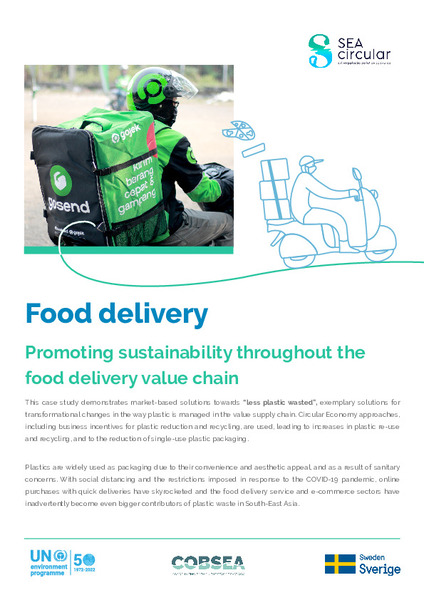| dc.contributor | Asia & Pacific Office | en_US |
| dc.contributor.author | United Nations Environment Programme | en_US |
| dc.contributor.author | Coordinating Body on the Seas of East Asia | en_US |
| dc.coverage.spatial | Asia and the Pacific | en_US |
| dc.date.accessioned | 2022-08-22T13:50:16Z | |
| dc.date.available | 2022-08-22T13:50:16Z | |
| dc.date.issued | 2022-08 | |
| dc.identifier.uri | https://wedocs.unep.org/20.500.11822/40499 | |
| dc.description | This case study demonstrates market-based solutions towards “less plastic wasted”, exemplary solutions for transformational changes in the way plastic is managed in the value supply chain. Circular Economy approaches, including business incentives for plastic reduction and recycling, are used, leading to increases in plastic re-use and recycling, and to the reduction of single-use plastic packaging. Plastics are widely used as packaging due to their convenience and aesthetic appeal, and as a result of sanitary concerns. With social distancing and the restrictions imposed in response to the COVID-19 pandemic, online purchases with quick deliveries have skyrocketed and the food delivery service and e-commerce sectors have inadvertently become even bigger contributors of plastic waste in South-East Asia. | en_US |
| dc.format | Text | en_US |
| dc.language | English | en_US |
| dc.relation.ispartof | SEA Circular Project | en_US |
| dc.rights | Public | en_US |
| dc.subject | food distribution | en_US |
| dc.subject | food waste | en_US |
| dc.subject | sustainability | en_US |
| dc.subject | sustainable consumption | en_US |
| dc.subject | circular economy | en_US |
| dc.title | Food Delivery: Promoting Sustainability throughout the Food Delivery Value Chain | en_US |
| wd.identifier.sdg | SDG 2 - Zero Hunger | en_US |
| wd.identifier.sdg | SDG 12 - Responsible Consumption and Production | en_US |


